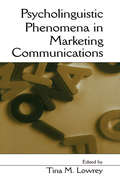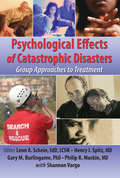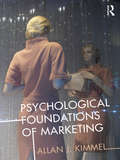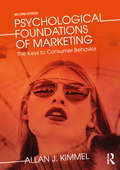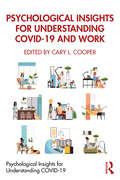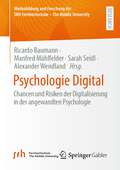- Table View
- List View
Psychodynamisches Coaching für Führungskräfte: Einzel- und Gruppencoachings in Theorie und Praxis (essentials)
by Beate West-Leuer Marga Löwer-HirschDieses essential bietet Einblicke in die Praxis des psychodynamischen Leadership-Coaching, welche gestützt werden durch authentische Beispiele aus der Beratungspraxis der Autorinnen. Die Kernkompetenzen des Führens werden von unbewussten Dynamiken gesteuert. In der Beziehung zum Coach können diese entdeckt und integriert werden. Der innere Handlungsspielraum erweitert sich, sowohl im psychodynamischen Einzel- wie auch im Gruppencoaching auf je unterschiedliche Weise.
Psycholinguistic Phenomena in Marketing Communications
by Tina M. LowreyThe field of psycholinguistics and the application of psycholinguistic theory to advertising and marketing communication has become a topic of great prominence in the field of consumer behavior. Psycholinguistic Phenomena in Marketing Communications is the first book to address the growing research in this area. This timely volume combines research conducted by current scholars as it demonstrates diversity of the field in terms of relevant topics and methodological approaches. It examines brand names and their semantic and sound-based impact; sentence structure and research in marketing communication; advertising narratives evoking emotional responses; the effects of empathy response on advertising; and the role of language and images in creation of advertising. The book includes authors from a variety of fields, including mass communication, marketing, social psychology, linguistics, and neuropsychology. A range of perspectives is discussed, from qualitative text analysis to controlled psychological experimentation. Psycholinguistic Phenomena in Marketing Communications is intended for students and scholars in numerous disciplines, such as advertising, marketing, social psychology, sociology, and linguistics. It is also suitable for graduate courses in these disciplines.
Psychological Analysis: How to Make Money, Outsmart the Market, and Join the Smart Money Circle (Wiley Trading)
by Adam SarhanBeat the market by using Psychological Analysis for investing and trading under any conditions Conventional wisdom tells us that people are rational and make rational decisions with their money. But that’s simply not true considering most people fail to beat the market. Conventional wisdom also tells us that there are two primary ways to approach the market: technical and fundamental analysis. Again, that is not true because if it were—everyone would be rich. Think about it, how many times have you seen stocks with poor fundamentals go up, or stocks with great technicals go down? It’s obvious that something is missing. Author Adam Sarhan, Founder and CEO of 50 Park Investments, developed a new approach, titled, Psychological Analysis (PA). Coined by the author, the term teaches you how to make rational, not emotional, decisions with your money and shows you how to analyze both the individual and collective market mindset at a particular time based on the behavior and decision-making of people in the real-world. Psychological Analysis is designed to tip the odds of success in your favor. After studying every major economic and market cycle going back to the 3rd century, the author explains that human nature is the one constant and tells you what actually drives markets. Psychological Analysis is responsible for major and minor market moves today, tomorrow, and all throughout history. Adam shows you that there are more factors that influence price than just fundamental or technical analysis and how to bring out the smart money superhero inside you. This invaluable guide helps you: Make rational, not emotional, decisions with your money—especially when you are under pressure Understand the psyche of the market so you can learn how to join the Smart Money Circle and consistently take money out Generate above average returns in all market environments Incorporate Psychological Analysis into your overall trading and investing strategy so you can make smarter decisions on and off Wall Street Psychological Analysis: How to Outsmart the Market One Trade at a Time is a must-have resource for traders, investors, finance professionals, and anyone who wants to profit regardless of market conditions.
Psychological Conflict Management: Professional Tools for Specialists and Managers (essentials)
by Werner Schienle Andreas SteinbornDo you want to handle conflicts (even) better? Do you want to know how to assert your interests without leaving a trail of broken relationships with colleagues, superiors, employees, or even in your social and friend circles? Here, you will find the answers. In this second edition of the essentials, which has already established itself as a standard work in its first edition, you will not only find a wealth of practical and easily applicable tools for everyday use, but you will also gain valuable insights into human thought and perception processes that promote conflict. Considering these insights will make your life much easier. Less petty conflicts, and more time and energy for your actual tasks.
Psychological Contracts in Organizations: Understanding Written and Unwritten Agreements
by Denise M. RousseauThe organizational, social and psychological meanings of contracts, both written and unwritten, are the focus of this volume. The author addresses a number of important topics including contract making, interpretation of contracts, contract violations, strategies for changing contracts and contracts evolving from circumstances relevant to the 1990s. In addition, a thought-provoking discussion of how contracts are linked to an organization's strategy and its human resource practices is included. The book concludes with an assessment of societal trends that point to large scale changes in future employment contracts.
Psychological Effects of Catastrophic Disasters: Group Approaches to Treatment
by Philip R. Muskin Joseph Rose Henry I Spitz Leon Schein Gary BurlingameA thorough, user-friendly guide of basic knowledge and group interventions for psychological trauma from terrorist attacks and other catastrophic disastersThere is relatively little literature on the psychological trauma caused by catastrophic disasters, including terrorist attacks and the impending threats of terrorism. Psychological Effects of Catastrophic Disasters: Group Approaches to Treatment fills that gap by comprehensively discussing ways to minimize the psychological damage resulting from catastrophic disasters as well as the trauma developed from the threat of future terrorist attacks. The book provides thorough presentations of almost manualized group methods for the prevention and treatment of the acute and longer-term psychological effects for children, adolescents, and adults.Appropriate treatment immediately after a catastrophe can diminish harmful psychological effects, enhance an individual&’s quality of life, decrease psychosomatic illnesses and the exacerbation of chronic medical conditions, increase the effective utilization of medical facilities, and decrease medical expenses. In this book, internationally renowned authorities provide practical expert suggestions and helpful examples to illustrate the interventions and provide a quick reference for professionals facing the aftermath of prospective terrorist disasters and other catastrophic events. Psychological Effects of Catastrophic Disasters: Group Approaches to Treatment is divided into four sections. The first section provides an overview of the book; the second discusses the foundations and broad issues which potentially affect the outcome of group treatment; the third section presents group models which address the particular needs of children, adolescents, parents, emergency service personnel, and mental health practitioners; and the fourth part considers future directions of treatment. Designed to be used as a comprehensive single source for professionals working with victims of trauma caused by terrorism or catastrophic disaster, this book can be read and used in its entirety, or specific chapters detailing treatments can be chosen and used independently as needed. Extensive references allow opportunities for further research.Psychological Effects of Catastrophic Disasters: Group Approaches to Treatment presents unique first-person accounts of September 11th and examines: the neurobiological effects of a traumatic disaster the effective use of psychotropic medication the implications of living with ongoing terrorist threats a new framework for preparedness and response to disasters and trauma for children and families cultural, religious, and ethnic differences related to the prevention and treatment of psychological sequelae the diagnosis and treatment of traumatic grief retraumatization, distressing reminders, and their effects on post-traumatic adjustment the knowledge trauma therapists need to integrate small group principles the diagnosis and group treatment of acute and long-term effects with adults and children the use of spiritual principles after a terrorist disaster or catastrophic event nine types of groups appropriate for specific populationsPsychological Effects of Catastrophic Disasters: Group Approaches to Treatment is a timely, comprehensive reference for social workers, psychologists, psychiatrists, health professionals, mental health professionals, educators, and students.The royalties from this book shall be donated to organizations which provide direct services to those who continue to be affected by the events of September 11th, 2001 and Hurricane Katrina (August 29th, 2005).
Psychological Empowerment and Job Satisfaction in the Banking Sector
by Elizabeth George Zakkariya K. A.This book explores how psychological empowerment can influence and enhance job satisfaction. The authors argue that in today’s working climate the wellbeing and involvement of employees is of utmost importance to any company’s overall success and that management techniques like empowerment are the most effective means of achieving this goal. Based on an empirical study examining job satisfaction amongst employees of several private sector, public sector and new generation banks in Kerala, India as well as extensive literature review, this book discusses the role psychological empowerment plays in enhancing job satisfaction both locally and internationally. It goes on to analyze four dimensions of psychological empowerment and the role of job satisfaction in the relationship between psychological empowerment and job related stress. This book will be of great interest to scholars in management and psychology and is essential reading for industrialists and managers wanting to apply empowerment strategies in their own workplace.
Psychological Foundations of Marketing
by Allan J. KimmelA CHOICE Outstanding Academic Title 2013! Are we influenced by ads even when we fast-forward them? Do brands extend our personalities? Why do we spend more when we pay with a credit card? Psychological Foundations of Marketing considers the impact of psychology on marketing practice and research, and highlights the applied aspects of psychological research in the marketplace. This book presents an introduction to both areas, and provides a survey of the various contributions that psychology has made to the field of marketing. Each chapter considers a key topic within psychology, outlines the main theories, and presents various practical applications of the research. Topics covered include: Motivation: The human needs at the root of many consumer behaviors and marketing decisions. Perception: The nature of perceptual selection, attention and organization and how these perceptual processes relate to the evolving marketing landscape. Decision making: How and under what circumstances it is possible to predict consumer choices, attitudes and persuasion? Personality and lifestyle: How insight into consumer personality can be used to formulate marketing plans. Social behavior: The powerful role of social influence on consumption. This book will be of great interest to a diverse audience of academics, students and professionals, and will be essential reading for courses in marketing, psychology, consumer behavior and advertising.
Psychological Foundations of Marketing: The Keys to Consumer Behavior
by Allan J KimmelThis is the only textbook to provide an applied, critical introduction to the role of psychology in marketing, branding and consumer behavior. Ideally suited for both students and professionals, the new edition is a complete primer on how psychology informs and explains marketing strategies, and how consumers respond to them. The book provides comprehensive coverage of: Motivation: the human needs at the root of many consumer behaviors and marketing decisions. Perception: the nature of perceptual selection, attention, and organization and how they relate to the evolving marketing landscape. Decision making: how and under what circumstances it is possible to predict consumer choices, attitudes, and persuasion. Personality and lifestyle: how insight into consumer personality can be used to formulate marketing plans. Social behavior: the powerful role of social influence on consumption. Now featuring case studies throughout to highlight how psychological research can be applied in the marketplace, and insightful analysis of the role of digital media and new technologies, this award-winning textbook is required reading for anyone interested in this fascinating and evolving subject.
Psychological Insights for Understanding COVID-19 and Work (Psychological Insights for Understanding COVID-19)
by Cary L. CooperIn the Psychological Insights for Understanding COVID-19 series, international experts introduce important themes in psychological science that engage with people’s unprecedented experience of the pandemic, drawing together chapters as they originally appeared before COVID-19 descended on the world. This timely and accessible book brings together a selection of chapters offering insights into issues surrounding work and the COVID-19 pandemic. Featuring content on topics such as health and wellbeing, work-family, flexible hours, organisational communication, talent management, recovery from work, employee engagement and flourishing, burnout, and organisational interventions, the book includes a specially written introduction contextualising the chapters in relation to the COVID-19 crisis. Reflecting on how psychological research is relevant during a significant global event, the introduction examines the potential future impact of the pandemic on the practice and study of psychology and our lives more generally. Featuring theory and research on key topics germane to the global pandemic, the Psychological Insights for Understanding COVID-19 series offers thought-provoking reading for professionals, students, academics and policy makers concerned with the psychological consequences of COVID-19 for individuals, families and society.
Psychological Ownership and Consumer Behavior
by Joann Peck Suzanne B. ShuThis pathbreaking volume expands on the construct of psychological ownership, placing it in the contexts of both individual consumer behavior and the wider decision-making of consumer populations. An individual’s feeling of ownership toward a target represents the perception that something is “mine!”, and is highly relevant to buying and relating to specific goods, economic and health decision-making and, especially salient given today’s privacy concerns, psychological ownership of digital content and personal data. Experts analyze the social conditions and cognitive processes concerning shared consumer experiences and psychological ownership. Contributors also discuss possibilities for socially responsible forms of psychological ownership using examples from environmental causes, and the behavioral mechanisms involved when psychological ownership becomes problematic, as in cases of hoarding. Included among the topics: Evidence from young children suggesting that even legal ownership is fundamentally psychological. Ownership, the extended self, and the extended object. Psychological ownership in financial decisions. The intersection of ownership and design. Can consumers perceive collective psychological ownership of an organization? Whose experience is it, anyway? Psychological ownership and enjoyment of shared experiences. Psychological ownership as a facilitator of sustainable behaviors including stewardship. Future research avenues in psychological ownership. Psychological Ownership and Consumer Behavior pinpoints research topics and real-world issues that will define the field in the coming years. It will be especially useful in graduate classes in marketing, consumer behavior, policy interventions, and business psychology.
Psychological Ownership: Eine identitätsbasierte Betrachtung im Kontext der Unternehmensnachfolge
by Sophie RuckauEine der wichtigsten und komplexesten Fragen, welche sich ein Unternehmer während seiner unternehmerischen Laufbahn stellen muss, ist, wer das Unternehmen nach seinem Austritt weiterführen soll. Dabei gelingt es einigen Unternehmern besser als anderen, den Unternehmensnachfolgeprozess zu meistern. Sophie Ruckau legt zu diesem, aus praktischer Sicht, hochinteressanten Feld der Unternehmensübergabe an einen Nachfolger erste Forschungsergebnisse aus identitätsbasierter Perspektive vor. Basierend auf dem Konstrukt des Psychological Ownership werden Einflussfaktoren wie beispielsweise Leidenschaft oder die Komplexität des Selbst aufgedeckt, welche zum Gelingen bzw. Scheitern einer Unternehmensnachfolge beitragen. Die Arbeit leistet somit einen Beitrag zur Fragestellung, welche individuellen Einflussfaktoren den Erfolg der Unternehmensnachfolge determinieren und liefert praxisrelevante Empfehlungen für Unternehmer, Nachfolger und Berater, welche zum Gelingen des Nachfolgeprozesses beitragen.
Psychological Perspectives on Financial Decision Making
by Tomasz Zaleskiewicz Jakub TraczykThis book reviews the latest research from psychology, neuroscience, and behavioral economics evaluating how people make financial choices in real-life circumstances. The volume is divided into three sections investigating financial decision making at the level of the brain, the level of an individual decision maker, and the level of the society, concluding with a discussion of the implications for further research. Among the topics discussed:Neural and hormonal bases of financial decision makingPersonality, cognitive abilities, emotions, and financial decisionsAging and financial decision makingCoping methods for making financial choices under uncertaintyStock market crashes and market bubblesPsychological perspectives on borrowing, paying taxes, gambling, and charitable giving Psychological Perspectives on Financial Decision Making is a useful reference for researchers both in and outside of psychology, including decision-making experts, consumer psychologists, and behavioral economists.
Psychological Perspectives on Leadership
by Jessica A. Kennedy Jennifer A. ChatmanThis chapter presents a psychological perspective on leadership, with an emphasis on the capabilities required for successful leadership in organizations and at the group level. The authors suggest three critical capabilities for organizational leadership that are distinct from the commonly cited personality or intelligence dimensions: the leader's diagnostic abilities, behavioral flexibility, and unambiguous signaling of intentions. At the team level, the authors describe three key leadership tasks: convening the group and developing identification, coaching group members, and setting group norms. This chapter was originally published as Chapter 6 of "Handbook of Leadership Theory and Practice: A Harvard Business School Centennial Colloquium."
Psychological Perspectives on Risk and Risk Analysis: Theory, Models, and Applications
by Martina Raue Eva Lermer Bernhard StreicherThis authoritative collection goes beyond economic statistics and probability data to offer a robust psychological understanding of risk perception and risk taking behavior. Expert contributors examine various risk domains in life, and pinpoint cognitive, emotional, and personality factors contributing to individual differences in risk taking as well as the many nuances social demographics (e.g., culture, gender) bring to risk decisions. Coverage takes competing theories and studies into account to identify mechanisms involved in processing and acting on uncertainty. And implications and applications are demonstrated in varied fields, from updated risk models for the insurance sector to improved risk communication in health services to considering risk perception in policy decisions. A sampling of the topics: Personality and risk: beyond daredevils—risk taking from a temperament perspective.Cognitive, developmental, and neurobiological aspects of risk judgments.The group effect: social influences on risk identification, analysis, and decision-making.Cognitive architectures as a scaffolding for risky choice models.Improving understanding of health-relevant numerical information.Risk culture as a framework for improving competence in risk management. Psychological Perspectives on Risk and Risk Analysis will be of great interest to researchers in and outside of psychology, including decision-making experts and behavioral economists. Additionally, this volume will appeal to practitioners who often have to make risky decisions, such as managers and physicians.
Psychological Requirements Analysis in Theory and Practice: For Executives and Human Resources Managers who Want to Raise Requirement Profiles (essentials)
by Heribert WienkampPsychological requirement analyses with their requirement and qualification profiles show what will be important at work in the future! Both the selection of applicants and the training of personnel, as was the case, for example, in view of new strategic challenges in the financing business of a bank, should benefit from this information, which is to be collected in advance by means of a mix of methods, e.g., questionnaires and "expert interviews" on site. Selected key personnel figures from operational HR work should be used to check whether the current HR strategy is "still on track".This Springer essential is a translation of the original German 1st edition essentials, Psychologische Anforderungsanalysen in Theorie und Praxis by Heribert Wienkamp, published by Springer Fachmedien Wiesbaden GmbH, part of Springer Nature in 2020. The translation was done with the help of artificial intelligence (machine translation by the service DeepL.com). A subsequent human revision was done primarily in terms of content, so that the book will read stylistically differently from a conventional translation. Springer Nature works continuously to further the development of tools for the production of books and on the related technologies to support the authors.
Psychological Traps: How to Avoid Some of the Tricks Your Mind Can Play on You When You're Deciding
by John S. Hammond Ralph L. Keeney Howard RaiffaCertain psychological traps can derail your ability to make smart choices and must be avoided. In this chapter, the authors show you how to identify and temper the impact of the most common psychological traps.
Psychological, Educational, and Sociological Perspectives on Success and Well-Being in Career Development
by Manfred Max Bergman Anita C. Keller Robin Samuel Norbert K. SemmerThis collection covers how success and well-being relate to each other in early career development in the domains of employment and education. It gives a conceptual overview of success and well-being as established in the psychological research tradition, complemented by educational and sociological approaches. The volume presents articles on success and well-being in applied contexts, such as well-being as an individual resource during school-to-work transition, or well-being and success at the workplace. Work psychologists, social psychologists, educational researchers, and sociologists will find this book valuable, as it provides unique insights into social and psychological processes afforded by the combination of disciplines, concepts, and a diversity of approaches.
Psychologie Digital: Chancen und Risiken der Digitalisierung in der angewandten Psychologie (Weiterbildung und Forschung der SRH Fernhochschule – The Mobile University)
by Sarah Seidl Ricardo Baumann Manfred Mühlfelder Alexander WendlandWesentliches Ziel dieses Sammelbandes ist es, einen Überblick über die Chancen und Risiken der Digitalisierung in verschiedenen Anwendungsbereichen der Psychologie zu entwickeln, z. B. in der Gesundheitsförderung, im Personalmanagement, in der psychosozialen Beratung oder in therapeutischen Beziehungen.Die Beiträge sollen die Vielfalt der Auswirkungen und Gestaltungsmöglichkeiten digitaler Medien auf und für die psychologische Profession aufzeigen und kritisch diskutieren. Dabei werden insbesondere empirische Arbeiten, Übersichtsarbeiten und konzeptionelle psychologische Arbeiten fokussiert.
Psychologie bei Gericht (Die Wirtschaftspsychologie)
by Michaela PfundmairDieses Buch bietet einen Überblick über die wichtigsten Fragestellungen der Rechtspsychologie, die sich im Rahmen von Gerichtsverhandlungen ergeben. Sie erfahren, wie forensisch-psychologische Gutachter ihre Bewertungen im Einzelfall vornehmen. Im Zentrum stehen Themen wie die Aussagepsychologie und die Familienrechtspsychologie. Wissenschaftliche Grundlagen werden mit zahlreichen Fallbeispielen und Bezügen zur Praxis verbunden. So ist das Buch auch für Leser ohne Fachkenntnisse leicht lesbar. Im Buch erfahren Sie… wie überprüft werden kann, ob eine Schilderung auf wahrem Erleben basiert.wie bewertet werden kann, wer Sorgerecht und Umgang bei einem Kind erhält und was bei Kindeswohlgefährdung passiert.wie abgeschätzt werden kann, ob ein Rechtsbrecher rückfällig wird.wie geprüft werden kann, ob ein Rechtsbrecher schuldfähig oder strafmündig ist.wie die Zuverlässigkeit einer Personenbeschreibung oder -identifizierung bewertet und wie sie verbessert werden kann.welchen psychologischen Effekten Richter und andere urteilende Verfahrensbeteiligte unterliegen. Zielgruppen: "Psychologie bei Gericht“ ist für alle lesenswert, die im weitesten Sinne mit Gerichten arbeiten – von psychologischen Gutachtern über Staatsanwälte bis hin zu Sozialarbeitern, aber auch Studierende und interessierte Laien, die mehr über die Themen und Tätigkeitsfelder der Forensischen Psychologie erfahren wollen. Die Autorin Michaela Pfundmair, Prof. Dr. phil. habil., Psychologin, ist Professorin an der Hochschule des Bundes in Berlin, wo sie zu sozial- und rechtspsychologischen Themen forscht und lehrt. Zu diesen Themenkomplexen publizierte sie international zahlreiche wissenschaftliche Artikel. Zudem arbeitet sie als aussagepsychologische Sachverständige, prüft und supervidiert Personen in der Weiterbildung für Rechtspsychologie BDP/DGPs und ist Vorsitzende der Sektion Rechtspsychologie im BDP.
Psychologie der Agilität: Lernwege für Individuen und Teams (essentials)
by Birgit Werkmann-Karcher Michael ZirklerAgilität ist in einer sich schnell verändernden komplexen Welt ein wesentliches Konzept zum erfolgreichen Handeln. Das Buch fokussiert auf psychologische Aspekte der Agilität und zeigt Entwicklungswege für Individuen, Teams sowie Organisationen auf, die an ihrer Agilität arbeiten und diese verbessern wollen. Es werden außerdem die „Risiken und Nebenwirkungen“ einer falsch verstandenen und übertriebenen Form von Agilität dargestellt.
Psychologie der Menschenführung
by Erich Dihsmaier Michael PaschenDas Buch löst sich von gängigen "Kochrezepten" der Ratgeber-Literatur und liefert eine ganzheitliche, psychologisch und philosophische fundierte Betrachtung der zentralen Führungsfragen: in der Arbeitswelt, der Politik und im Alltag. Die Autoren nehmen jeweils einen bestimmten Gesichtspunkt von Führung unter die Lupe und erklären, wie z. B. durch Charisma, Motivation oder das Lösen von Konflikten Führungskraft entwickelt werden kann. Dabei verknüpfen sie fundamentale Einsichten mit praktischen Antworten. Alle Kapitel auch zum Anhören auf CD.
Psychologie der Menschenführung: Wie Sie Führungsstärke und Autorität entwickeln
by Erich Dihsmaier Michael PaschenDies ist kein typischer Führungsratgeber! Denn dieses Führungsbuch löst sich von den üblichen Kochrezepten und Modellen: Durch klare Gedankengänge, eine Orientierung an großen Führungsleistungen und eine psychologische und philosophische Fundierung erzeugt es ein tieferes Verständnis, einen ganzheitlichen Blick, eine echte Faszination für das Thema Führung. In der Arbeitswelt, in der Politik, im Leben – welches sind die wirklichen Mechanismen, die bewirken, dass Ihnen Menschen folgen? Warum sind manche Führungskräfte erfolgreich - und andere scheitern?Das Buch verknüpft fundamentale Einsichten nahtlos mit praktischen Antworten für die wichtigsten Führungsprobleme und Herausforderungen. Jedes der 11 Kapitel nimmt einen bestimmten Gesichtspunkt von Führung genauer unter die Lupe und erklärt, wie Sie Ihre persönlichen „Führungs-Kräfte“, z. B. Charisma, Motivations- oder Durchsetzungsfähigkeit entwickeln, Krisen und Konflikte bewältigen oder Strukturen schaffen können. Auch Fragen der Ethik sowie mögliche Fehlentwicklungen im Zusammenhang mit Führung und Macht werden beleuchtet.Ein Buch für etablierte oder angehende Führungskräfte, die sich konzeptionell und psychologisch breiter für diese Aufgabe wappnen möchten und reflektieren wollen, wie sie ihre Führungspotenziale noch besser entfalten können. Jetzt in überarbeiteter und aktualisierter 2. Auflage.
Psychologie der Mitarbeiterführung: Wirtschaftspsychologie kompakt für Führungskräfte (essentials)
by Florian BeckerGute Führung ist Millionen wert, schlechte Führung kann unbezahlbare Schäden anrichten. Deshalb setzt Florian Becker an der Führungskompetenz an. Er ermöglicht mit Spezialistenwissen und langjähriger Praxiserfahrung wertvolle Einblicke in die Psychologie der Führung. Wer mit Führung zu tun hat, erfährt die wichtigsten Ergebnisse der Führungsforschung und erhält Tipps sowie neue Perspektiven zu den Themen Führungsziele und -instrumente, die Rolle der Menschenbilder, Führungstheorien sowie Entwicklung und Einsatz von Führungskompetenz. Der Autor schafft damit ein kompaktes Fundament für den Erfolg als Führungskraft.
Psychologie des Geschichtenerzählens
by Tobias C. BreinerIn diesem Buch geht es um die Psychologie guter Geschichten und deren Handlungsfiguren. Es beantwortet Fragen wie:Warum rühren uns manche Filme zu Tränen und andere lassen uns kalt?Warum fesseln uns manche Romane so, dass wir bis tief in die Nacht weiterlesen? Warum quälen wir uns dagegen durch manche Pflichtlektüre hindurch?Warum zocken wir manches Adventure-Game bis zum letzten Level während wir bei anderen schnell die Lust verlieren? Das Werk ist für all diejenigen verfasst, die sich in irgendeiner Weise mit der Erzeugung und Bewertung von Handlungen befassen. Sowohl Charakter- und Game-Designer profitieren durch neue archetypische Modelle und Psychologen können mit der hier präsentierten dodekazyklischen Heldenreise innovative therapeutische Methoden entwickeln. Roman- und Drehbuchautoren bekommen eine Blaupause für erfolgsversprechende Geschichten, die sich auch auf das Interactive Storytelling übertragen lässt und Regisseure sowie Film-, Computerspiel- und Literaturkritiker erhalten durch den Inhalt des Werkes gezielte Bewertungskriterien.

